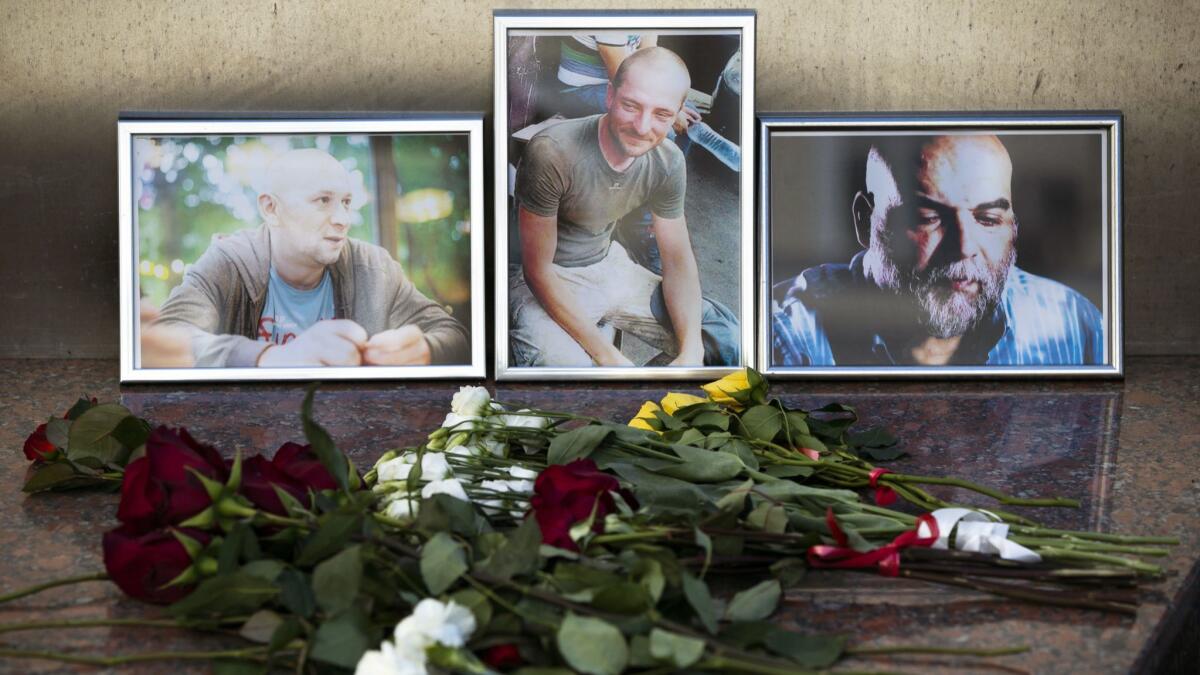Russian journalists slain while investigating Kremlin-linked company in Central African Republic

- Share via
Reporting from Moscow — Three Russian journalists investigating a shadowy private military group linked to a close associate of the Kremlin have been killed in the Central African Republic.
The three journalists, Kirill Radchenko, Alexander Rastorguyev and Orkhan Dzhemal, were found dead Monday night on a highway outside the town of Sibut, about 115 miles north of the capital, Bangui, authorities said late Tuesday night.
“According to the driver’s explanations, when they were [14 miles] from Sibut … armed men emerged from the bush and opened fire on the vehicle. The three journalists died instantly,” Reuters quoted Sibut Mayor Henri Depele as saying.
Another official from Sibut told news agencies that the journalists “were kidnapped by about 10 men, all turbaned and speaking only Arabic,” who later killed the three men.
Although details of the journalists’ deaths remained murky, the incident raised alarms in the journalist community in Russia, where killings of and attacks on reporters and editors occur at some of the highest rates in the world. Russian President Vladimir Putin has cracked down on independent media and press freedom during his nearly two decades in power. Television and print media have been nationalized or heavily influenced by the Kremlin.
Reporters Without Borders ranked Russia 148 out of 180 countries in its 2018 world press freedom annual survey. The Committee to Protect Journalists says 58 journalists have been killed in Russia since 1992.
The three journalists were in the war-torn Central African Republic investigating a private Russian paramilitary company that is believed to have sent mercenaries to Syria and eastern Ukraine on behalf of Moscow. The Wagner Group came into focus in February when a U.S. airstrike in Syria was believed to have killed dozens of its fighters. Private military organizations are illegal in Russia, and the Kremlin denied the dead mercenaries were working with or for its military.
Wagner is believed to be owned by Yevgeny Prigozhin, a close friend of Putin’s. Prigozhin is also linked to the internet trolling factory in St. Petersburg, Russia, accused of creating thousands of bots and social media profiles that interfered with the 2016 presidential election, U.S. investigators say.
Special counsel Robert S. Mueller II indicted Prigozhin this year as part of that investigation.
The three journalists’ deaths were widely reported in Russia, although state media avoided mentioning the subject the team of documentary filmmakers was investigating.
The three journalists were all accomplished reporters who had worked for the top names in Russia’s limited independent and opposition media. Many of their projects touched on themes that were irritating to the Kremlin, including Putin’s political opponents and Moscow’s involvement in eastern Ukraine.
The team was in Africa working in collaboration with the Investigations Management Center, an arm of a foundation funded by exiled Russian opposition figure Mikhail Khodorkovsky. The former tycoon-turned-dissident now lives in London after serving 10 years in prison on financial charges he says were politically motivated.
The center said the journalists had flown into the Central African Republic on Friday. Their last contact with the center was on Sunday, the organization’s website said.
Flight from Rage: Conflict in the Central African Republic »
“It’s impossible to believe this, but there is already no hope that this is a mistake,” the Investigations Management Center said in a statement on its website and Facebook page.
Khodorkovsky and the editor of the investigative center said they were skeptical of the official version of the journalists’ death.
Andrei Konyakhin, chief editor of the Investigations Management Center, told the Associated Press that he doubted that robbery was a motive. Associates of the journalists told Russian media that the reporting team had about $8,500 in cash, as well as expensive video cameras. The cameras had not been recovered as of Wednesday.
The killing was done in “a very demonstrative fashion,” Konyakhin told the AP. “If they could have just taken everything from them, why kill them?”
Yulia Latynina, a Russian journalist known for her outspoken criticism of the Kremlin, also cast doubt on the ambush version of the killings in her column (link in Russian) Wednesday on the independent Novaya Gazeta newspaper’s website.
The day before they died, the journalists were at a training camp they believed was used by Wagner mercenaries, she wrote. They were turned away for not having permission from the Central African Republic’s Defense Ministry, the Investigations Management Center’s deputy editor told the independent Rain TV.
The next day, the journalists’ driver recommended a fixer for them to meet, Latynina wrote. When the car was ambushed and the journalists were killed, the driver somehow managed to escape unharmed, she wrote.
“This story is implausible,” Latynina said.
Russia’s Foreign Ministry confirmed the journalists’ identity Wednesday and said it was working with Central African Republic officials to investigate their deaths, according to ministry spokeswoman Maria Zakharova.
The journalists had traveled on a tourist visa and not heeded security cautions about traveling in the region, Zakharova said.
“I will not now evaluate the actions of people who sent three journalists to the CAR under the guise of tourists,” Zakharova said in a Facebook post.
Ayres is a special correspondent.
UPDATES:
1:53 p.m.: This article has been updated throughout with staff reporting.
This article was originally posted at 6:50 a.m.
More to Read
Sign up for Essential California
The most important California stories and recommendations in your inbox every morning.
You may occasionally receive promotional content from the Los Angeles Times.














